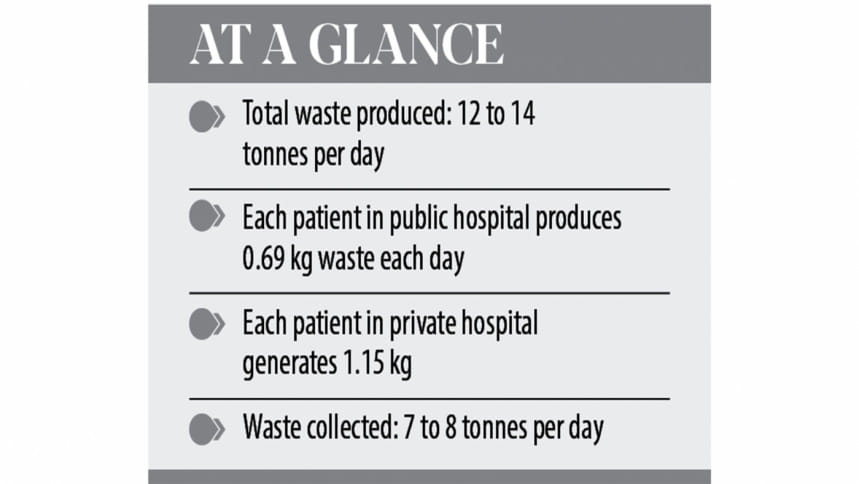A health hazard for Khulna residents

Khulna is facing a severe health hazard as around half of the clinics, hospitals, and diagnostic centres in the city do not have their own waste-disposal mechanism and dump unsorted garbage in street bins, said officials of Directorate General of Health Services and Khulna City Corporation (KCC).
Similar situation prevails in the other 117 medical facilities in nine upazilas of Khulna, they said.
According to Md Abdul Aziz, chief conservancy officer of KCC, 12 to 14 tonnes of clinical waste is produced every day. Of those, two NGOs -- Prodipan and Sadichha -- collect only 7 to 8 tonnes from 172 out of the 406 hospitals and clinics regularly.
Only Khulna Medical College Hospital and BNS Upasham (Navy hospital) have their own waste disposal plants, the KCC official added.
Each patient of a private hospital produces 1.15 kilos of waste a day, while a public-hospital patient generates 0.69 kilos. As there are no specific legal provisions for clinical waste management, half of the hospitals dispose of their waste in city corporation bins with other wastes, according to KCC.
Amputated body parts, stool, urine, blood, phlegm, bandages, syringes, needles, and other materials used in laboratories and medical services are often dumped on the city's roadsides, causing serious public nuisance and health risk.
Palash Das, a resident of the city's Boyra Das Para area, said amputated human body parts are often seen in front of KMCH and adjacent areas.
Dr Sheikh Baharul Alam, president of Bangladesh Medical Association Khulna, said unsafe dumping poses a serious health risk. "Some trash collected pick up used syringes and other clinical materials from the hospitals and sell them to syndicates at low prices."
Dr Sujat Ahmed, civil surgeon of Khulna, issued notices to all clinics to set up plants for the proper disposal of biomedical waste. While some clinic owners responded positively, many are yet to take any waste-management policy.
"If clinical waste is not managed properly, waste collectors, health professionals, and the common people may be affected by various contagious diseases, including HIV, hepatitis B and C, skin disease, asthma, diarrhoea, allergy, and eye irritation," he said.
Ferdasur Rahman, executive director of NGO Prodipan, said the government has placed more emphasis on medical waste management under the national health rule of 2011. Prodipan collects only 5,500 kilos of clinical waste per day, including 23 kilos of sharp medical waste.
Dr Gazi Mizanur Rahman, chairman of Gazi Medical College Hospital, admitted that it is difficult to maintain medical waste properly in their social and practical reality, and they rely on an NGO for waste management.
Iqbal Hossain, director of the Department of Environment, Khulna, said a lack of human resources prevents them from conducting drives in regards to waste mismanagement in every sector.
"The hospital and clinic authorities should install their own incinerators to destroy waste, and they should follow the rules for their own interest," he added.

 For all latest news, follow The Daily Star's Google News channel.
For all latest news, follow The Daily Star's Google News channel. 



Comments